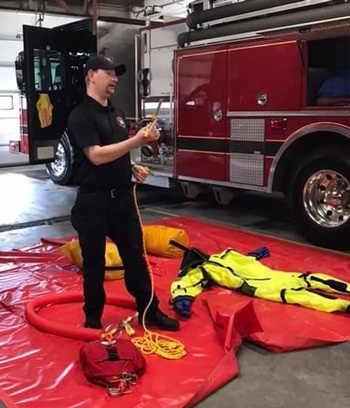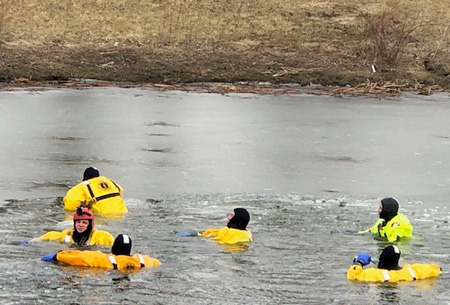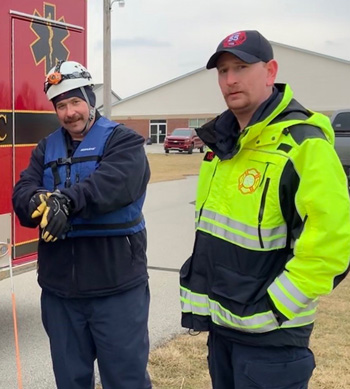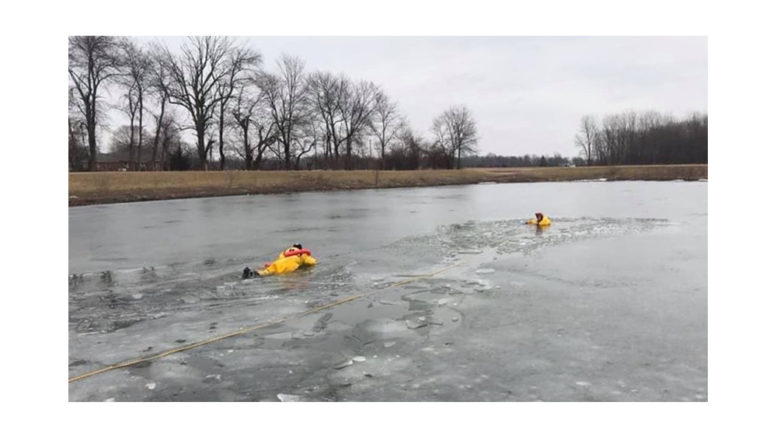Your local fire departments get calls for a variety of emergencies throughout the year. One of the less common types of calls is also the most dangerous: Ice and cold-water rescue. Thanks to Firefighter Paramedic Sean Dayton at Jackson Township Fire Department, all of Hamilton County is now a little safer in winter emergencies.
Dayton is the Training Coordinator for Jackson Fire, and he recently became a training instructor for ice and cold-water rescue, so he was able to provide training to several fire departments in the area. He and others spoke to The Reporter about the importance of this level of training.

Jackson Township Training Coordinator Sean Dayton demonstrates some of the equipment used for ice and cold-water rescues. (Photo provided)
“It started the year before last,” Dayton said. “I had attended an ice rescue class in Bloomington, Ind. While I was down there, I learned about fire departments in Indiana and Ohio that had been involved in ice rescue where they had used programs where they worked off standard operating procedures (SOPs) and standard operating guidelines (SOGs). Unfortunately, one of their rescues didn’t go so well and a teenager died from the event. It did not appear to be any fault of the fire department. They had the equipment and their own training program, but nobody was actually certified. The family sued and won a tort claim against the fire department because they simply did not carry a certification.”
That prompted Jackson Fire to ask how they could become a technically certified fire department for ice and cold-water rescue. Indiana does not provide certification for ice and cold-water rescue. That’s done through the National Fire Protection Association (NFPA). Indiana is not an NFPA state, but departments can be sued to NFPA standards.
“We started looking through the NFPA guidelines,” Dayton explained. “A lot of states on the west coast are NFPA states and have to adhere to those rules and guidelines. Indiana is an OSHA (Occupational Safety and Health Administration) state, so we only have to abide by OSHA standards because for us, OSHA is the law.”
NFPA standards cover more ground and are specific to firefighters.
“Since Indiana did not provide a certification course for ice and cold-water rescue standards, I attended the course in Wisconsin,” Dayton told The Reporter. “I attended it during the polar vortex we just had. It was -55 with the wind chill and the ambient temperature was -26 degrees. It was interesting because water can’t get any colder than 32.5 degrees. When you are standing in air temperatures of -26 degrees, when you get in water at 32.5 degrees it is like getting in a sauna.”

Photo provided
Dayton said the suits they have to protect them from cold water do an outstanding job and fire fighters can spend hours in the water without any problem.
According to Dayton, NFPA standards that cover Ice and Cold-water rescue are NFPA 1006 and NFPA1670. They define the training standards for awareness, operations and technician levels of certification. The recent class taught both operations and technician certification.
Not everyone who wanted to attend was able to because the class needed to be rescheduled for a time when ice was present.
The Reporter was unable to confirm by press time that Dayton may be the only certified instructor in the area, but Dayton and Chief Jeff Muszar had not heard of anyone else in the area offering this level of training and certification.
“What I have found out when reaching out to the larger departments is that they have been more than willing to offer any services that we need to help us fulfill out training obligations,” Chief Muszar said. “Especially Noblesville, our closest neighboring department, has been more than willing to help and we are exceptionally grateful to them and everyone in the area.”
Dayton echoed Muszar’s gratitude to other departments in the area, saying this training could not have been accomplished without them.
“I would like to thank the department who attended and the departments who wanted to attend, as well as a very special thank you to Indianapolis, Cicero and Sheridan Fire Departments for allowing us to borrow their ice rescue suits,” Dayton said. “By ourselves, we did not have enough suits for everybody who attended.”
Everyone on the Jackson Township Fire Department is now a certified technician, while Dayton is the only certified trainer.
“When you are looking at ice and cold-water rescue, you are literally looking at 10 minutes or less before your victim may be unconscious and go subsurface,” Dayton said. “We need to be on scene within minutes and that is what this program allows us to do.”
Another aspect of this training that can indirectly save human lives is when the department is called out to save an animal on the ice.
“We often get calls for animal rescue because we are a farming community,” Dayton explained. “A horse, cow or dog may fall through the ice. Some people may ask, ‘Why would you even go out there after it?’ At the end of the day, if you do not go after the family pet, that homeowner will. That’s human nature. That’s a family pet – that’s a loved one to them. We go out and get those animals off the ice, too.”
If the fire department will not go out there, they are passively risking the life of a person who may go after their animal without the training or equipment.
“When assessing your risk versus benefit, your risk is high and the benefit is not great for that animal, but in the bigger picture you do not want that homeowner going out on that ice because you did not help their pet,” Dayton said. “It is best to go get that pet and not risk anybody else who may go out there.”
According to Battalion Chief James Carter, the program was very well received by other fire departments in the area.
“We had very positive feedback,” Carter said. “Tipton Fire came down. They do not have an ice rescue team or the suits, so this was their very first time experiencing it. It is something they are looking into. Those guys took home a lot of knowledge and Sean is going to continue to work with them to help them get that program up and running.”

Jackson Township’s Battalion Chief James Carter (left) and Training Coordinator Sean Dayton get ready for cold-water rescue training. (Photo provided)
Recertification for ice and cold-water rescue is required annually.
“These guys sacrifice a lot,” Carter said about the level of work and training involved. “They work hard. They are doing everything within their power to ensure everyone in Jackson Township and the surrounding areas are getting the best quality service. That says a lot for the guys who are doing this.”
Unless Hamilton County’s Hometown Weatherman, Paul Poteet, calls from another cold snap, it will be next winter before Jackson Township can hold another training program. For safety, they need at least three inches of ice present during ice rescue training.

